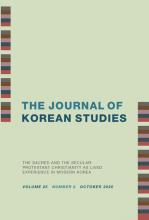In the 1900s American missionaries used the industrial vision of the African American leader Booker T. Washington to instill the idea of economic progress in Koreans. Inspired by this uplift model, the Korean intellectual Yun Ch’i-ho (Yun Ch’iho) and US Southern Methodists founded the Anglo-Korean School in 1906, where students would later produce textile products called “Korea mission cloth” for global sale. This article examines the promotion of manual labor in the intersection of religious propagation and educational reform during the early twentieth century. The author argues that the idealization of industrialization by American and Korean Protestant leaders was a vehicle to both disseminate American discourses of race and institutionalize a system of capitalism in the name of modernizing Korea. This early history of Korean Protestantism has influenced the hierarchical conceptualizations of the white, black, and Asian races, which has been obscured by the benevolent achievements of missionary work.
